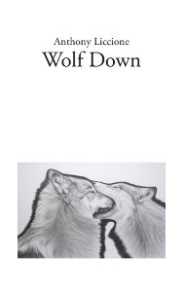
Anthony Liccione
Wolf Down
US Trade, 84pp, €12, December 2011
ISBN 979-10-90394-20-9
The cover image is Wolf Eat WolfMagnhild Opdøl
View a video of Illusion, a poem from the book.
Knowing what“s out there in the world doesn“t mean you also have to let it destroy you. The good is taken with the bad in Wolf Down, and the transition from one to the other is seamless, and the mark of a writer as tired yet willing and eager to continue on. It is the gratitude of still being alive, coming through the minor and severe hells of an ordinary day more or less intact. It is not something easily gained in life, but it“s always worth trying for. The writer capable of telling us of their journey through this as well as Liccione will never lack for material. When the material is as good as that which is found in Wolf Down we gain almost as much as he does. Just by reading what’s on his mind. Gabriel Ricard, Unlikely Blog
The first indication of what to expect in Anthony Liccione“s Wolf Down is his biography on the back. The bio is a grim and sobering reminder of the kind of hard knocks life can deliver and his poems follow the same trajectory: raw, dark, and unforgiving. Wolf Down“s template is the dull, routine, and unflattering part of life. But what gives this book its edge is Liccione“s poetic skill, which lies in his ability to deftly lift scenarios out of the ordinary and stain them with gloom. He hops from news stories turned tragic in One to distasteful corners of society in The Dance of Ignorance, delivering his poems with an unflinching, surgical eye. “As I write,” he says in Starvation, again “the world grows uglier…” The world“s ugliness, no doubt, has informed Liccione“s style and he serves it up cold: in death beds and at the back of police cars. He paints domesticity as a sort of grim banality (What tomorrow may bring); treats domestic violence with disturbing routine (Coping with cops, that drive with a dozen donuts on the front seat); and allows us to be a fly on the wall as a man receives his medical death sentence (Bad news, too soon). Bleak, yes. But in dark holes, there’s that occasional light. And in Wolf Down, poems like Sense of freedom remind us that sparks of happiness can exist even within the darkest of writers. Underground Voices